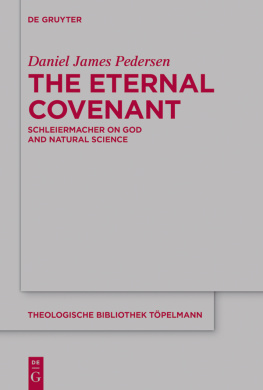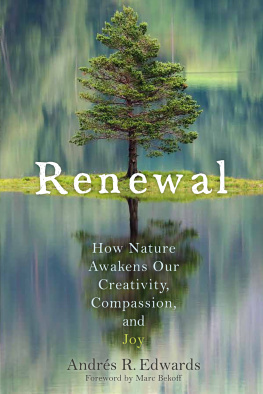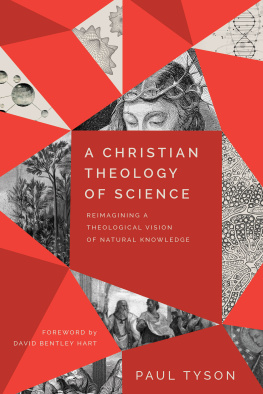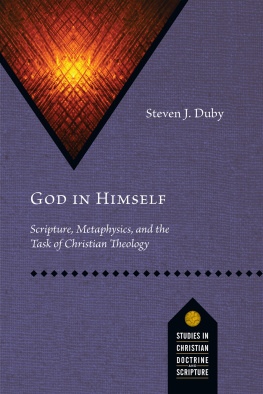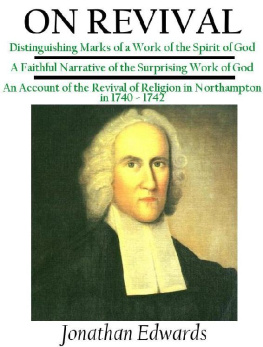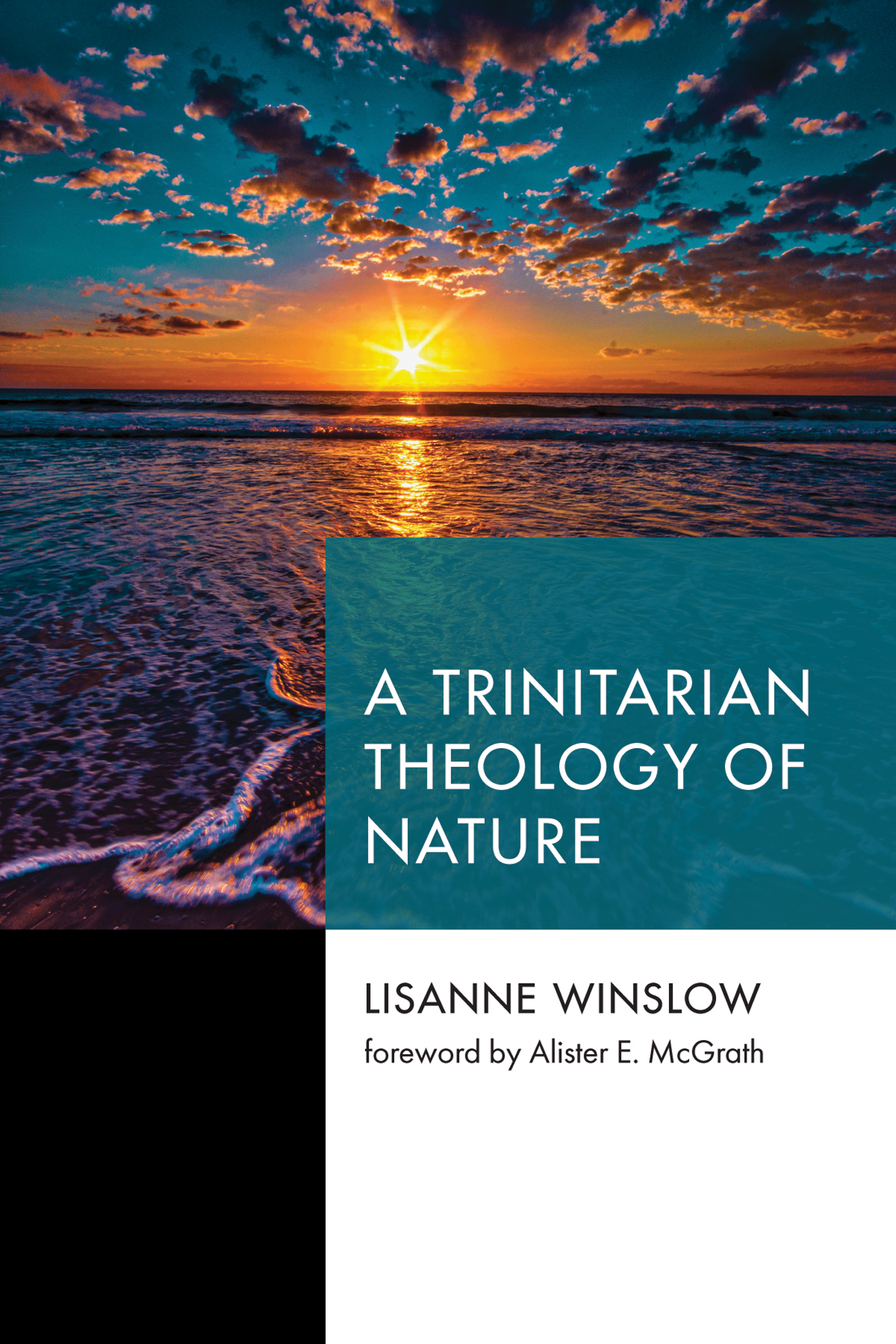A Trinitarian Theology of Nature
Lisanne Winslow
with a foreword by Alister E. McGrath

Princeton Theological Monograph Series
K. C. Hanson, Charles M. Collier, D. Christopher Spinks, and Robin Parry, Series Editors
Recent volumes in the series:
Paul W. Chilcote
Making Disciples in a World Parish:
Global Perspectives on Mission and Evangelism
Nathan Montover
Luthers Revolution:
The Political Dimensions of Martin Luthers Universal Priesthood
Jon Paul Sydnor
Ramanuja and Schleiermacher:
Toward a Constructive Comparitive Theology
Eric G. Flett
Persons, Powers, and Pluralities:
Toward a Trinitarian Theology of Culture
Vladimir Kharlamov
Theosis: Deification in Christian Theology, volume
Mitzi J. Smith
The Literary Construction of the Other in the Acts of the Apostles:
Charismatics, the Jews, and Women
For Arianna and Sophia
Whenever God does anything, he leaves the imprint of his nature upon what he does. Therefore, the creation of the world is at the same time a revelation, a self-communication of God.
Emil Brunner
A TRINITARIAN THEOLOGY OF NATURE
Princeton Theological Monograph Series
Copyright 2020 Lisanne Winslow. All rights reserved. Except for brief quotations in critical publications or reviews, no part of this book may be reproduced in any manner without prior written permission from the publisher. Write: Permissions, Wipf and Stock Publishers, W. th Ave., Suite , Eugene, OR 97401 .
Pickwick Publications
An Imprint of Wipf and Stock Publishers
W. th Ave., Suite
Eugene, OR 97401
www.wipfandstock.com
paperback isbn: 978-1-5326-8413-5
hardcover isbn: 978-1-5326-8414-2
ebook isbn: 978-1-5326-8415-9
Cataloguing-in-Publication data:
Names: Winslow, Lisanne, author. | Alister E. McGrath, 1953 , foreword.
Title: A trinitarian theology of nature / Lisanne Winslow ; foreword by Alister
McGrath.
Description: Eugene, OR: Pickwick Publications, 2020. | Princeton Theological Monograph Series | Includes bibliographical references.
Identifiers: isbn 978-1-5326-8413-5 ( paperback ). | isbn 978-1-5326-8414-2 ( hardcover ). | isbn 978-1-5326-8415-9 ( ebook ).
Subjects: LCSH: NatureReligious aspectsChristianity. | Religion and science. | Science and theology. | Edwards, Jonathan, 17021758 . | Brunner, Emil, 18891966 .
Classification: BT695 W56 2020 ( print ). | BT695 ( ebook ).
Manufactured in the U.S.A. May 14, 2020
Scriptures taken from the Holy Bible, New International Version, NIV. Copyright 1973 , 1978 , 1984 , 2011 by Biblica, Inc. Used by permission of Zondervan. All rights reserved worldwide. www.zondervan.com The NIV and New International Version are trademarks registered in the United States Patent and Trademark Office by Biblica, Inc.
Front cover image Ben Mulder.
Acknowledgments
I have learned throughout my life that while we may undertake many projects solo, we never accomplish them alone. The writing of this book is one such undertaking. Dr. Philip Ziegler, my doctoral supervisor at the University of Aberdeen, Scotland, spent four years discussing and refining the very ideas that are presented in this book. Dr. Zieglers ardent work with me was exactly the kind of direction I needed. He helped me transition from thinking and writing as a scientist , to thinking and writing as a theologian . He welcomed all of my ideas and taught me how to refine my thinking. He helped me see when my theological writing became to worshipful and churchy, which I tended frequently to lapse into, and to save that wonderful prose and scriptural insight for sermons. I am truly indebted to him for helping me not only in my refinement as a theologian, but to see the places where academic theological reflection and church ministry necessarily overlap (in full Barthian style), and where they serve different purposes. I would like to extend special gratitude to Dr. Tom Greggs and Dr. Alister McGrath, who served on my dissertation committee, for critical discussions that have refined my constructive theology. In particular, my theological thinking has been greatly influenced by Dr. Alister McGrath, whose extensive thinking and writing on a theology of nature gave me a framework and a starting place theologically and biblically. Through our email discourses and conversations, and through his kind willingness to serve as the outside reader for my doctoral dissertation, Dr. McGrath has guided me in my thinking toward a high level of academic and theological rigor, without losing a preeminent focus on the God for whom we are writing, as well as an understanding of the faith communities to which we bring such spiritual insights for a deeper, more authentic faith. I am also indebted to him for generously writing the Foreword of this book.
I am smiling as I recall wonderful theological discussions and editorial input over a good meal with the Thinklings, Dr. Walter Schultz, philosophy professor at the University of Northwestern and Dr. Philip Rolnick, theologian at the University of St. Thomas. These two gentlemen have given me tremendous insight into the depth and effectiveness of the kind of philosophical and theological discussion possible between colleagues who respect one anothers work. Particularly I would like to thank Walter Schultz for team-teaching many courses with me at Northwestern, for consistent and rigorous collaboration on research projects together and with students, and for co-presenting our philosophical theology of nature at Harvard Divinity School, Oxford, Glasgow, Zurich, and elsewhere. It was Dr. Schultz who introduced me to Jonathan Edwards creation metaphysics and theology, for which I am ever grateful. The reading of Edwards has greatly influenced my understanding of nature, and gave me the vocabulary I needed to do this work resulting in several papers and two books as well as the development of three unique pedagogical approached to teaching Edwards at the undergraduate level. Thank you, Walter.
Special thanks to the administration of the University of Northwestern, in particular, Dr. Janet Sommers, Senior Vice President of Academic Affairs. Thank you Dr. Sommers for your continued and consistent enthusiastic support, encouragement, and prayers which have opened all the doors for the successful Science and Theology program at Northwestern which has, in ways too numerous to mention, influenced the scholarship in this book. Thank you for your friendship which has yielded much fruit in each of our lives as well as in the institution we both diligently serve. A heartfelt thanks to my Teaching Assistants, Austin Chiappetta, Bishoy Botros, Anastasia Harper, and Arianna Winslow who helped with typing and transcriptions of citations, quotations, and editing. Special thanks to my students in Jonathan Edwards Seminar and in Science and Theology for fruitful discussions of many of the ideas presented in this book. Thanks to Lanny Kuester co-minister, and to the congregations of Peoples Congregational Church and Mendota Heights United Church of Christ for participating in sermons and Bible study groups exploring the spiritual dimensions of the Trinitarian Theology of Nature.
To my dearest daughters, Ari and Sophie, thank you for continually inspiring me, for being a true encouragement, and for the conversations that have helped flesh out many of the ideas in this book.
Most of all, I would like to thank the Love that Created for keeping me in the laboratory of preparation as a scientist for twenty-five years in order to do this theological work.


